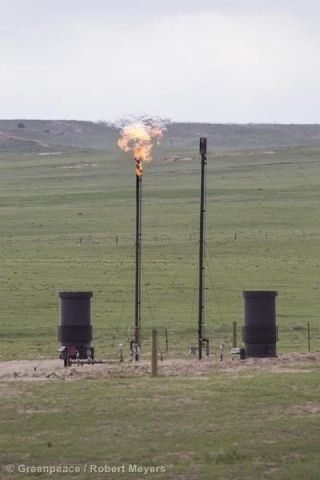This is a guest post by Jesse Coleman and originally appeared on the Greenpeace blog.
Inside Climate News has revealed that a key leader of oil and gas industry front groups that oppose new fracking regulations may have been playing both sides of the issue. In an investigation into the funding of the Environmental Defense Fund’s (EDF) work on oil and gas regulation, Inside Climate News discovered that a key EDF funder had hired FTI Consulting’s David Blackmon to promote fracking regulations. Unbeknownst to his employer, Blackmon is a longtime oil industry consultant who is paid to oppose regulation of the fracking industry.
The Cynthia and George Mitchell Foundation
The funder in question is the Cynthia and George Mitchell Foundation, established by the late George Mitchell, known as the “father of fracking.” George Mitchell owned and operated Mitchell Energy, the first company to combine horizontal drilling and hydraulic fracturing in the Barnett shale, which sparked the “shale revolution.” Mitchell created the foundation with part of the $3.5 billion sale of Mitchell Energy to Devon Energy. The Mitchell Foundation describes itself as “a grantmaking foundation that seeks innovative, sustainable solutions for human and environmental problems.”
While its goals seem noble, the fortunes of the Foundation and the people who run it continue to be inexorably linked to the success of the oil and gas industry. The Foundation itself has more than $38 million in stock in Devon Energy. Three of George Mitchell’s beneficiaries own over $21 million of Devon Energy apiece. All together, the Mitchell foundation and the Mitchell heirs own over 1/5th of Devon Energy.
One such heir is Todd Mitchell, who sat on the Foundation’s board for years, and worked for Devon Energy for a decade. He currently runs oil and gas production companies, and an investment business built off the assumption that gas will provide the baseload for electricity generation around the globe.
The Cynthia and George Mitchell Foundation has funded a series of greenwashing efforts that have portrayed the shale and fracking industry as safe, clean, and reliable. These efforts include an online-based “virtual reality” well pad that makes no mention of water or air quality concerns. In fact, the “virtual well pad” does not mention any of the environmental of social impacts that communities near shale drilling experience.
However, the Mitchell Foundation has also dedicated millions of dollars to groups that are trying to “green” the shale industry, like the Environmental Defense Fund. Since 2012, the Foundation has given over $1 million to EDF. The funding was for studies of methane emissions from the fracking industry. These studies, which have been criticized as incomplete, are built on a base assumption the drilling can be done “right.”
They have also led to some of the first federal regulations on the shale industry, including the methane regulations announced by the Obama Administration in early 2015.
The Foundation also gives to a range of environmental groups, some of which are strongly opposed to fracking and oil and gas development, like the Tides Foundation and the Sierra Club.
David Blackmon and FTI Consulting’s Conflicts of Interest
While the Mitchell family’s finances are tied to the success of the gas industry in general, the Foundation’s funding of efforts to limit pollution from fracking appears genuine. That is what makes the Mitchell Foundation’s hiring of David Blackmon and FTI Consulting so peculiar.
In 2012, the Mitchell Foundation selected David Blackmon of FTI Consulting to run the Foundation’s gas strategy. FTI Consulting is a PR firm that has worked with the shale and fracking industry to limit shale regulations by attacking journalists and community groups. FTI Consulting runs Energy In Depth, an oil and gas industry front group that maintains a hard line of attack against those who would regulate or criticize it’s corporate funders. The Mitchell Foundation paid FTI Consulting $120,000 to “start a dialogue between fossil fuel concerns and environmentalists around natural gas.”
David Blackmon himself has long been a power player in the world of pro-fracking PR. Blackmon started his career as an oil industry flack, doing communications work and lobbying for Shell, Tesoro, and various other oil and gas companies. More recently, he has had top positions with nearly every major pro-fracking front-group, including the Consumer Energy Alliance, Energy in Depth, and the industry’s biggest lobbying arm, America’s Natural Gas Alliance.
That Blackmon was in charge of the Mitchell Foundation’s gas strategy is troubling. His career has been dedicated to obstructing and delaying regulation on the oil and gas industry, especially in regards to fracking. While working for Mitchell, he led industry-funded groups that opposed the very methane regulations he was hired by Mitchell to promote. It is also troubling because of David Blackmon‘s personal denial of the science of climate change, and aggressive denial of the environmental and health impacts from fracking, which he called an “attention-grabbing boogeyman for all manner of nutcases, chicken littles and radicalized environmental organizations.”
Clips from Blackmon’s twitter account reinforce the fact that he denies some of the basic pieces of climate change science:
Global (non-)Warming Update!: El Niño or ñot, the Pause lengthens again http://t.co/IwuP2SNodH via @wattsupwiththat – David Blackmon (@GDBlackmon) April 6, 2015
More #climate alarmist fraud: Ocean pH Accuracy Arguments Challenged with 80 Years of Instrumental Data http://t.co/t8XTv83TxW – David Blackmon (@GDBlackmon) March 31, 2015
Fracking has been shown to pose a serious threat to the climate, given that methane, gas’s primary component, traps 86 times more heat in the atmosphere than CO2.
Blackmon and FTI Consulting’s anti-regulatory and pro-fracking work constitute a potentially major undisclosed conflict of interest. Marilou Hastings, the communications manager for the Mitchell Foundation, admitted to Inside Climate that before settling on FTI, she approached and was turned down by “more than a dozen consulting firms,” due to conflicts of interest. When she approached FTI Consulting and Blackmon, they not only accepted the job, but failed to reveal their anti-regulatory work to Hastings.
Inside Climate News writes that Hastings “didn’t know of FTI Consulting’s ties to anti-regulatory efforts.” Furthermore, at the same time that Blackmon was being paid by the Mitchell Foundation, Energy In Depth, which is run by FTI Consulting and boasts David Blackmon as a “field director, ” attacked the very studies Blackmon was paid to promote. All the while, Blackmon was using his position as a contributor to Forbes, to promote the Mitchell Foundation’s work, without disclosing his financial incentives. This potentially violated Forbes’ conflicts of interest clause.
This begs the question, did David Blackmon use his position with the Mitchell Foundation, in which he was tasked with promoting regulation, to feed information to his colleagues at FTI Consulting, which is paid to oppose regulation?
Image credit: Robert Meyers, Greenpeace
Subscribe to our newsletter
Stay up to date with DeSmog news and alerts








